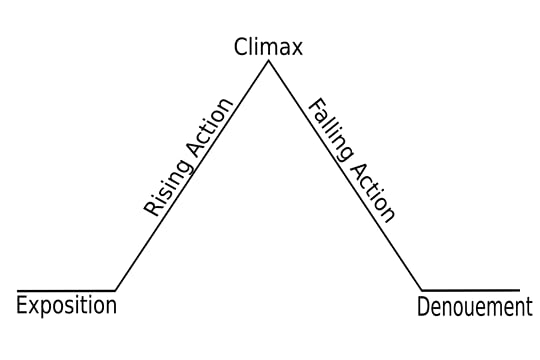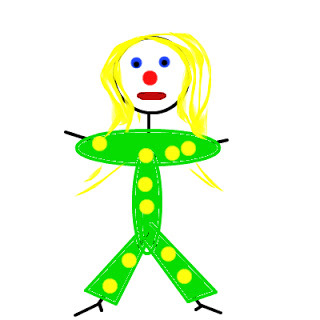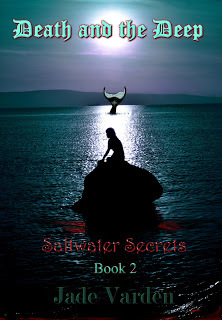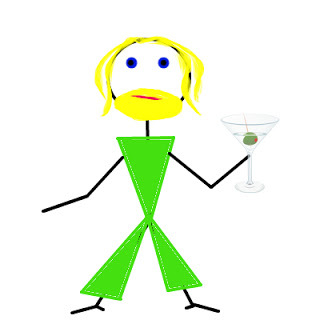Jade Varden's Blog, page 8
August 29, 2015
Death and the Deep: Official Trailer
It's not live to the general public, but it is available to you! Get a look at the official trailer for "Death and the Deep," Book 2 of the Saltwater Secrets Trilogy.
Get a free sample of the Death and Deep now, even before it's available in stores!
Get a free sample of the Death and Deep now, even before it's available in stores!
Published on August 29, 2015 05:30
August 27, 2015
Writing 101 Redux: Accept and Except
They sound the same, but they have totally different meanings. Do you know the right way to use accept and except?

Read today's TBT Writing 101 tip to learn how to use accept and except the right way, and you won't mix them up again.

Read today's TBT Writing 101 tip to learn how to use accept and except the right way, and you won't mix them up again.
Published on August 27, 2015 05:30
August 26, 2015
Writing 101: The Diagram of a Story
I still remember the day I saw this diagram put up on the blackboard in English class. This is the formula of writing a story….or so they say. Is this what the diagram of a story looks like to you -- and every author in the world?

The Sum of Its Parts
This diagram is actually known as Freytag's pyramid, and it represents the five parts (or acts) of a dramatic arc. You can find this pyramid in a lot of storytelling, from books to movies.
Exposition: The introduction. This is where you introduce your characters and lay out the setting. You also set up the conflict and action here.Rising action: Stuff starts to happen. We know who the bad guy is now, and we know what obstacles we have to overcome. Climax: Dramatic conclusion to the conflict! Falling action: The aftermath of the drama. Denouement: The end of the story.
The dramatic arc is pretty simple when you break it down into parts like this...but not all stories are this simple to tell. Not all stories follow this pattern, in fact. Some stories start off with the action in progress, then go back and tell you more about the characters later. Some stories are cliffhangers that end at the height of the drama -- at the climax.
Following a formula like this is a good way to get comfortable with storytelling, but there are no rules in writing. You don’t have to follow Freytag’s pyramid or anyone else’s diagram, either. When you’re writing, follow your own advice and develop your own patterns. Part of finding your own voice as a writer means finding your own way to tell a story. Maybe that means following this standard diagram...and maybe, it doesn’t.

The Sum of Its Parts
This diagram is actually known as Freytag's pyramid, and it represents the five parts (or acts) of a dramatic arc. You can find this pyramid in a lot of storytelling, from books to movies.
Exposition: The introduction. This is where you introduce your characters and lay out the setting. You also set up the conflict and action here.Rising action: Stuff starts to happen. We know who the bad guy is now, and we know what obstacles we have to overcome. Climax: Dramatic conclusion to the conflict! Falling action: The aftermath of the drama. Denouement: The end of the story.
The dramatic arc is pretty simple when you break it down into parts like this...but not all stories are this simple to tell. Not all stories follow this pattern, in fact. Some stories start off with the action in progress, then go back and tell you more about the characters later. Some stories are cliffhangers that end at the height of the drama -- at the climax.
Following a formula like this is a good way to get comfortable with storytelling, but there are no rules in writing. You don’t have to follow Freytag’s pyramid or anyone else’s diagram, either. When you’re writing, follow your own advice and develop your own patterns. Part of finding your own voice as a writer means finding your own way to tell a story. Maybe that means following this standard diagram...and maybe, it doesn’t.
Published on August 26, 2015 05:30
August 25, 2015
Writing 101: Funny Business
It's a widely-accepted truth that people like to laugh. Even sad stories -- especially sad stories -- need to give readers a chuckle now and them. If you aren't naturally a funny person, it's really hard to write funny. That's why some writers need to master certain tricks to do it. Once you do, the business of being funny isn't so hard after all.

Funny Characters
One of the simplest ways to add humor to a book is to do it through a funny character. Have someone in the book deliver your one-liners, and you can drop a little comedy into any part of the book that feels too serious and heavy. Being funny gets a little easier if you craft a character that’s around just to be a clown. Now, all you need to know how to do is write a clown.
The sarcastic character: Sarcasm can be humorous, when applied correctly. Add a smart-mouth character to your book so they can roll their eyes and deliver lines that start with “yeah, right.” The dumb character: One of the simplest ways to inject humor into a book is to inject a slightly idiotic character in there. It’s okay to do this as long as the dumb character is sort of in on the joke. In other words, don’t poke fun at them -- just have them show up, get confused and say something that you just have to chuckle at. It’s all in good fun.The quick character: If you do have a sense of comedic timing, it won’t be too difficult to write that quick, bright character that can inject a cute pun or funny line seamlessly into the conversation. This character’s got a quick answer for everything, and that’s where some of the best comedy lives. Since you have the option of taking as long as you need to take to write the lines, your character can be quick even if you aren’t.
You don't have to be a clown to write a clownish character. In other words, you don’t necessarily have to be funny to write a little humor. Stay true to the funny character you create, and you’ll find it easier to craft funny lines. Know the character, model them after a funny person you know, and work out their lines until they give you a little laugh. The more you write funny characters, the easier the business of being funny will become.

Funny Characters
One of the simplest ways to add humor to a book is to do it through a funny character. Have someone in the book deliver your one-liners, and you can drop a little comedy into any part of the book that feels too serious and heavy. Being funny gets a little easier if you craft a character that’s around just to be a clown. Now, all you need to know how to do is write a clown.
The sarcastic character: Sarcasm can be humorous, when applied correctly. Add a smart-mouth character to your book so they can roll their eyes and deliver lines that start with “yeah, right.” The dumb character: One of the simplest ways to inject humor into a book is to inject a slightly idiotic character in there. It’s okay to do this as long as the dumb character is sort of in on the joke. In other words, don’t poke fun at them -- just have them show up, get confused and say something that you just have to chuckle at. It’s all in good fun.The quick character: If you do have a sense of comedic timing, it won’t be too difficult to write that quick, bright character that can inject a cute pun or funny line seamlessly into the conversation. This character’s got a quick answer for everything, and that’s where some of the best comedy lives. Since you have the option of taking as long as you need to take to write the lines, your character can be quick even if you aren’t.
You don't have to be a clown to write a clownish character. In other words, you don’t necessarily have to be funny to write a little humor. Stay true to the funny character you create, and you’ll find it easier to craft funny lines. Know the character, model them after a funny person you know, and work out their lines until they give you a little laugh. The more you write funny characters, the easier the business of being funny will become.
Published on August 25, 2015 05:30
August 24, 2015
What You Have in Common with Chaucer...and Mark Twain
I always wanted to be an author, growing up, so I always answered with that when people asked me. They would then invariably try to give me advice about how to do it. Write what you know, they would always say. That’s confusing advice. You can’t always know what it’s like to swim in the ocean or climb a tree, but you can still write about these things. But authors like Geoffrey Chaucer and Mark Twain understood the idiom, and they used it in their books. You probably have something in common with these two greats, too.

It’s Not What You Know…
I found out that “write what you know” can apply to just about anything. You can write about going to the Grand Canyon after visiting it. You can write about shopping because you’ve done it. But many of the greatest authors used it to create their characters. Two of the greatest character-creators ever were Chaucer and Twain...and they did it by writing not what they knew, but who they knew. Huck Finn, one of literature’s most well-known characters, is totally based on someone Twain knew. The great author said himself that he re-created a young man named Tom Blankenship “exactly as he was.” And in so doing, Twain got credit for crafting a remarkable character. Only he didn’t. He just wrote about someone he already knew.
Chaucer wrote about the everyday people he encountered, too. His “Canterbury Tales” are considered to be one of the most important story collections ever written. Yes, ever. And if you were ever forced to read it, as I was, you’ll see that he was basically describing the people he met or saw. He just described it really well, that’s all.
Sometimes, to be one of the greatest authors, that’s all you have to do. Pick a “character” that you already know, and describe them well. Who knows? You may end up writing literature that everyone else has to study in school later.

It’s Not What You Know…
I found out that “write what you know” can apply to just about anything. You can write about going to the Grand Canyon after visiting it. You can write about shopping because you’ve done it. But many of the greatest authors used it to create their characters. Two of the greatest character-creators ever were Chaucer and Twain...and they did it by writing not what they knew, but who they knew. Huck Finn, one of literature’s most well-known characters, is totally based on someone Twain knew. The great author said himself that he re-created a young man named Tom Blankenship “exactly as he was.” And in so doing, Twain got credit for crafting a remarkable character. Only he didn’t. He just wrote about someone he already knew.
Chaucer wrote about the everyday people he encountered, too. His “Canterbury Tales” are considered to be one of the most important story collections ever written. Yes, ever. And if you were ever forced to read it, as I was, you’ll see that he was basically describing the people he met or saw. He just described it really well, that’s all.
Sometimes, to be one of the greatest authors, that’s all you have to do. Pick a “character” that you already know, and describe them well. Who knows? You may end up writing literature that everyone else has to study in school later.
Published on August 24, 2015 05:30
August 22, 2015
Death and Deep: Coming Soon!
Death and the Deep
 coming in September!
coming in September!
I came back to the land because I thought it would be safe. I didn’t know the waves would keep calling me, even weeks after I decided to leave them for ever.
That’s the problem with the oceans. The things we leave behind in the waves have a way of washing back up to the shore. Everything I left in the water is still out there…and I can hear it calling for me, no matter how hard I try to block the sound of the waves.
There is death waiting for me in the deep. But no matter how hard I try to stay on the land, the ocean won’t stop trying to claim me as one of its own. I’m afraid that soon, it’s going to succeed.
Get a sneak peek at Death and the Deep
 coming in September!
coming in September!I came back to the land because I thought it would be safe. I didn’t know the waves would keep calling me, even weeks after I decided to leave them for ever.
That’s the problem with the oceans. The things we leave behind in the waves have a way of washing back up to the shore. Everything I left in the water is still out there…and I can hear it calling for me, no matter how hard I try to block the sound of the waves.
There is death waiting for me in the deep. But no matter how hard I try to stay on the land, the ocean won’t stop trying to claim me as one of its own. I’m afraid that soon, it’s going to succeed.
Get a sneak peek at Death and the Deep
Published on August 22, 2015 05:30
August 20, 2015
Writing 101 Redux: There, Their, They're
Some writing lessons deserve to be repeated -- a lot.

One set of words that cause many authors to struggle is there, their and they're. Learn the difference with today's Throwback Thursday Writing 101 tip, and don't get your words wrong anymore.

One set of words that cause many authors to struggle is there, their and they're. Learn the difference with today's Throwback Thursday Writing 101 tip, and don't get your words wrong anymore.
Published on August 20, 2015 05:30
August 19, 2015
Writing 101: Skipping Time
One of the first books I ever loved follows the first-person perspective of a single character for about three years, and it’s so rich in detail that you live practically every day with the heroine. Except for that weird chapter that begins with a shocking sentence. In that sentence, the author skips ahead an entire year. Skipping time is an often-used fiction device, and it’s often jarring and upsetting. That’s probably because authors rarely do it really well.

Flashing Forward
In the book I’m making an example of, the narrator carefully details a year while living inside a very strange environment. The reader sees every detail, thought and spoken word unfold. I don’t think a single day is left out. Then all of a sudden, a year flies by. It’s just one sentence, and the first year took many chapters. No matter how you want to read it, that’s a jarring change of pace. It takes a few paragraphs to get back into the flow of things, after that. If your book is strong enough, you can always get over a rough spot.
...But why would you want to have a rough spot?
Smooth Timing
Some time skips are jarring; others are infuriating. I almost flew into a rage when I read chapter after chapter after chapter about an epic journey in a book I’d waited years to read. Hundreds of pages of walking from one place to the next, and at the end of that trip it was necessary to walk all the way back -- a feat accomplished with, I kid you not, one sentence.
Skipping time becomes necessary sometimes, but it goes much smoother with the reader if you find a way to write it that feels okay and doesn’t interrupt the rest of the story. Always skip time, if you can, at the beginning of a chapter so that it feels a little more natural. Ease readers into the skip, when possible, by still providing a description -- however brief -- of the missing time. Don’t do it abruptly, unless you’re planning to shock the readers.
Make your time skips as smooth as possible when you have to use them. Otherwise, you will literally be stopping and re-starting your book. Anything that takes readers out of the story, even briefly, is best avoided.

Flashing Forward
In the book I’m making an example of, the narrator carefully details a year while living inside a very strange environment. The reader sees every detail, thought and spoken word unfold. I don’t think a single day is left out. Then all of a sudden, a year flies by. It’s just one sentence, and the first year took many chapters. No matter how you want to read it, that’s a jarring change of pace. It takes a few paragraphs to get back into the flow of things, after that. If your book is strong enough, you can always get over a rough spot.
...But why would you want to have a rough spot?
Smooth Timing
Some time skips are jarring; others are infuriating. I almost flew into a rage when I read chapter after chapter after chapter about an epic journey in a book I’d waited years to read. Hundreds of pages of walking from one place to the next, and at the end of that trip it was necessary to walk all the way back -- a feat accomplished with, I kid you not, one sentence.
Skipping time becomes necessary sometimes, but it goes much smoother with the reader if you find a way to write it that feels okay and doesn’t interrupt the rest of the story. Always skip time, if you can, at the beginning of a chapter so that it feels a little more natural. Ease readers into the skip, when possible, by still providing a description -- however brief -- of the missing time. Don’t do it abruptly, unless you’re planning to shock the readers.
Make your time skips as smooth as possible when you have to use them. Otherwise, you will literally be stopping and re-starting your book. Anything that takes readers out of the story, even briefly, is best avoided.
Published on August 19, 2015 05:30
August 18, 2015
Writing 101: Repeating Words
If you write long enough, you’re going to develop a stable of favorite words. I use “clearly” all the time and describe things as “gray” way too often. When you edit your books, you should also be checking to see how often you’re repeating words. Too much repetition ruins the flow of the book and ends up becoming distracting...becoming distracting.

Clearly, Repetition is Bad
It’s really easy to fall into patterns when you write a lot. Scene structure, dialogue and your narrative voice can start to become formulaic, and you may find yourself repeating words. It’s a bad writing habit that you can’t always break.
You can, however, edit it.
Spot your writing patterns and the words you use. I know, for example, to be on the lookout for the word “clearly.” After you’ve edited your book for plot, grammar, punctuation, spelling and all the usual suspects, be sure to edit it for cadence and tone. If you notice one word that keeps jumping out of you while you’re reading, it’s because you’ve used that word too much.
Repetition can sometimes be beneficial to a book, but only when it’s used intentionally to create a certain rhythm. When it’s happening by mistake and it’s out of your control, you’re interrupting the flow of your words. Fix it, find new words, and you’ll create a much smoother work of fiction.

Clearly, Repetition is Bad
It’s really easy to fall into patterns when you write a lot. Scene structure, dialogue and your narrative voice can start to become formulaic, and you may find yourself repeating words. It’s a bad writing habit that you can’t always break.
You can, however, edit it.
Spot your writing patterns and the words you use. I know, for example, to be on the lookout for the word “clearly.” After you’ve edited your book for plot, grammar, punctuation, spelling and all the usual suspects, be sure to edit it for cadence and tone. If you notice one word that keeps jumping out of you while you’re reading, it’s because you’ve used that word too much.
Repetition can sometimes be beneficial to a book, but only when it’s used intentionally to create a certain rhythm. When it’s happening by mistake and it’s out of your control, you’re interrupting the flow of your words. Fix it, find new words, and you’ll create a much smoother work of fiction.
Published on August 18, 2015 05:30
August 17, 2015
Author, Interrupted
It was the second of July in the year 1961, and Ernest Hemingway was famous. He was a well-loved, bestselling American novelist and one of the world's most celebrated storytellers. This is why so many people cannot fathom why Hemingway woke from his bed that morning at 7, walked to his storage room and took out a shotgun. He placed the barrel of the gun against his forehead, and fired. It was a tragic ending to the story of an adored author.

The Hemingway Curse
At first, his wife claimed the gunshot was accidental. He'd been cleaning the weapon, she said. Finally, she admitted that she believed he had intentionally killed himself. It didn't make any sense. Hemingway was larger than life. He was a world traveler, a bullfighter, a hunter of big game, a man's man and an amazing writer. Why would such a man end it all when he was so successful and so admired by the world?
Biographers and others have spent years studying his life, trying to unravel the mystery that was Hemingway. A man of many hobbies and multiple marriages, he was a self-professed heavy drinker and seemed driven toward danger his entire life. He was known to be irritable and have terrible mood swings. He threw relationships away and started new ones.
Looking back, it seems that he was never satisfied with anything. He moved from marriage to marriage, obsession to obsession, and seemed to trying to wring everything he could out of life. Maybe he was looking for happiness instead.
Some psychiatrists now believe that Hemingway suffered from a number of psychological problems, including intense depression and bipolar disorder. In looking back, many have believed that his family has strong tendencies toward manic depression.
And in 1960, Hemingway was depressed. He was unable to write and soon became intensely paranoid. He couldn't even bring himself to write just one sentence for the inauguration of John F. Kennedy when asked. He was treated for his condition with horrifying electro-shock therapy, and was stopped in at least one suicide attempt before he ended his life.
In the years since, other members of the Hemingway family have taken their own lives. Many have speculated that a curse hangs over the family. But the facts don’t support supernatural causes in his death -- they clearly point toward great emotional distress. In short, Hemingway was unhappy. He was unhappy with himself, deeply so, and spent his life chasing something that he, apparently, never found.
It’s easy to romanticize such a man, especially after reading his amazing words. It’s easy to say that he was brilliant, and his emotional disturbance helped him tap into a form of creativity otherwise unachievable. Maybe all that stuff is true, in fact. But if he was given a choice, Hemingway might have chosen not to be a famous storyteller. He might have simply picked being happy instead.

The Hemingway Curse
At first, his wife claimed the gunshot was accidental. He'd been cleaning the weapon, she said. Finally, she admitted that she believed he had intentionally killed himself. It didn't make any sense. Hemingway was larger than life. He was a world traveler, a bullfighter, a hunter of big game, a man's man and an amazing writer. Why would such a man end it all when he was so successful and so admired by the world?
Biographers and others have spent years studying his life, trying to unravel the mystery that was Hemingway. A man of many hobbies and multiple marriages, he was a self-professed heavy drinker and seemed driven toward danger his entire life. He was known to be irritable and have terrible mood swings. He threw relationships away and started new ones.
Looking back, it seems that he was never satisfied with anything. He moved from marriage to marriage, obsession to obsession, and seemed to trying to wring everything he could out of life. Maybe he was looking for happiness instead.
Some psychiatrists now believe that Hemingway suffered from a number of psychological problems, including intense depression and bipolar disorder. In looking back, many have believed that his family has strong tendencies toward manic depression.
And in 1960, Hemingway was depressed. He was unable to write and soon became intensely paranoid. He couldn't even bring himself to write just one sentence for the inauguration of John F. Kennedy when asked. He was treated for his condition with horrifying electro-shock therapy, and was stopped in at least one suicide attempt before he ended his life.
In the years since, other members of the Hemingway family have taken their own lives. Many have speculated that a curse hangs over the family. But the facts don’t support supernatural causes in his death -- they clearly point toward great emotional distress. In short, Hemingway was unhappy. He was unhappy with himself, deeply so, and spent his life chasing something that he, apparently, never found.
It’s easy to romanticize such a man, especially after reading his amazing words. It’s easy to say that he was brilliant, and his emotional disturbance helped him tap into a form of creativity otherwise unachievable. Maybe all that stuff is true, in fact. But if he was given a choice, Hemingway might have chosen not to be a famous storyteller. He might have simply picked being happy instead.
Published on August 17, 2015 05:30



